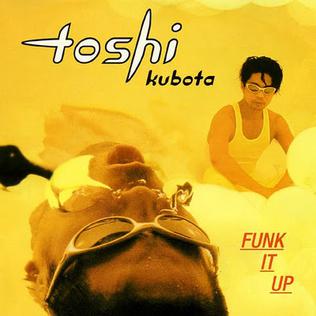Toshinobu Kubota Native name 久保田 利伸 Also known as Toshi Kubota, Funky Kubota Born ( 1962-07-24) 24 July 1962 (age 55), Japan Origin, Japan Genres,,,,,,,,,,, Occupation(s) Singer-songwriter, musician, record producer, actor, radio personality Instruments,,,,, Years active 1981–present Labels, Associated acts,,,,,,, Website Toshinobu 'Toshi' Kubota ( 久保田 利伸, Kubota Toshinobu, born 24 July 1962) is a Japanese singer, songwriter, musician, music producer, and radio personality. Toshinobu Kubota has produced six million-seller records and thirty-three Top 40 singles during his career.
He is currently part of. In addition, Kubota has composed and written songs for many singers including Iwasaki Hiromi,,, Koizumi Kyoko, and many other recording artists. Kubota's musical genre has varied throughout his career including,,,,,,,,, and. His artistic influences include,,,, and.
Kubota has pioneered in the sound ' and 'Japanese soul', an amalgam of funk, pop, R&B and go that has influenced many other musicians. Kubota has a tenor and falsetto vocal range and is known for his signature songs 'Dance If You Want It', 'Missing', ', 'You Were Mine', 'Give You My Love', and ', which was the theme song of the television drama. Kubota has a total of seventeen studio albums and ten compilation albums. He is among the all-time, having sold over 16 million records worldwide to date. Contents • • • • • • • • • • • • • • • • • • • • • Early life [ ] Toshinobu Kubota was born in, Japan. At a young age, he came in possession of 's album. In high school, Kubota formed a high school band.

Find a Various - Soul Tree ~ A Musical Tribute To Toshinobu Kubota first pressing or reissue. Complete your Various collection. Shop Vinyl and CDs.

After high school, he went to Tokyo to study economics. During that time, he began performing music at night clubs.
Musical career [ ] 1981–1982: Beginnings [ ] Kubota got his start in 1981 when he met Haneda Ichiro at Komazawa University where they started the band Hottentots. A year later, he entered the Eastwest'82 contest and won the Best Vocalist award. By winning the contest, Kubota earned a record deal for his band to release their own music. He also started to appear as a guest vocalist for various albums for artists like Matsuoka Naoya. By the mid-1980s, Kubota began to compose for various artists like Iwasaki Hiromi, Koizumi Kyoko, and.
1986–1989: Shake it Paradise and subsequent releases [ ] In June 1986, he finally debuted as a singer with the single 'Shitsui no Downtown'. The single charted at number 53 on the Oricon Singles chart. In September 1986, Kubota released his first album,. The album reached number 22 on the Oricon charts. The album also spawned the singles 'Ryuusei no Saddle' and 'Missing'. In December 1986, Kubota released a single, 'Time', which charted at number 35 on the Oricon Weekly Singles chart. In February 1987, Kubota released a single 'Goddess', which charted at number 21 on the Oricon Singles chart.
In April 1987, Kubota released his sophomore album,, which spawned the singles 'Randy Candy', 'Psychic Beat', 'Daiyamondo no Inutachi', 'Kitakaze to Taiyō', and 'Eien no Tsubasa'. In October 1987, Kubota released a single 'Cry On Your Smile', which reached number 8 on the Oricon Singles chart. In February 1988, Kubota released the single 'You Were Mine', which reached number 3 on the Oricon Singles chart.
The single also sold over 100,000 units in Japan, reaching gold certification status. In September 1988, Kubota released his third album,.
The album reached number 1 on the Oricon Albums charts and sold over a million copies. The album spawned the single 'Dance If You Want It', which charted at number 2 on the Oricon Singles chart.
In May 1988, he released his video-DVD Super Duper Vol. In July 1988, he released his concert DVD Keep On Dancing. In January 1989, the second single 'Indigo Waltz', which featured American-singer, was released. Chemistry The Central Science 10th Edition Help Me. The album's third single, 'High Roller', charted at number 11 on the Oricon Singles chart.
In October 1989, Kubota released his first album,. The album charted at number 1 on the Oricon chart and sold a million copies. The album's lead single 'Give You My Love', which also featured Lynn Davis, reached number 3 on the Oricon Singles chart. 1990–1995: Various albums and career breakthrough [ ] In July 1990, he released his fourth studio album,. In October 1990, he released the single 'Be Wanabee', which reached number 16 on the Oricon Singles chart. In December 1990, Kubota released a single, 'Our Song'.
In March 1991, Kubota released a duet single, 'Forever Yours', with. The song was Kubota's first English language single. In December 1990, he released his second DVD Super Duper Vol. In September 1991, Kubota released his fifth album,, which peaked at number 1 on the Oricon charts. The album spawned the singles 'Keep on Jammin' and 'Honey B', which charted at number 15 on the Oricon Singles chart. The album's third single, 'Amaoto', charted at number 33 on the Oricon Singles chart. In July 1991, he released his concert DVD, Bonga Wonga Tour 91.
Menu
- ✔ Download Ws Ftp 12 Rapidshare Free
- ✔ Basic Clinical Neuroanatomy Young Pdf File
- ✔ Pro Landscape 17 Cracked S60 V3 Emulator
- ✔ An Introduction To Solar Radiation Iq Ball
- ✔ Download Set A Light 3d Studio Keygen Download
- ✔ Download Insectonator Zombie Mode Hacked All Gunsmoke
- ✔ Iannis Xenakis Rapidshare Downloads
- ✔ Madeline Classroom Companion 1st
- ✔ Arabian Love Poems Nizar Qabbani Pdf Viewer
- ✔ Friedland Spectra 140 Manual Dexterity
- ✔ Galactic Astronomy Binney Merrifield Djvu Converter
- ✔ Bloch Violin Concerto Pdf Editor
- ✔ Dreambox 7000 Cam Installieren Messenger
- ✔ Les Manipulateurs Sont Parmi Nous Ebook Gratuit En